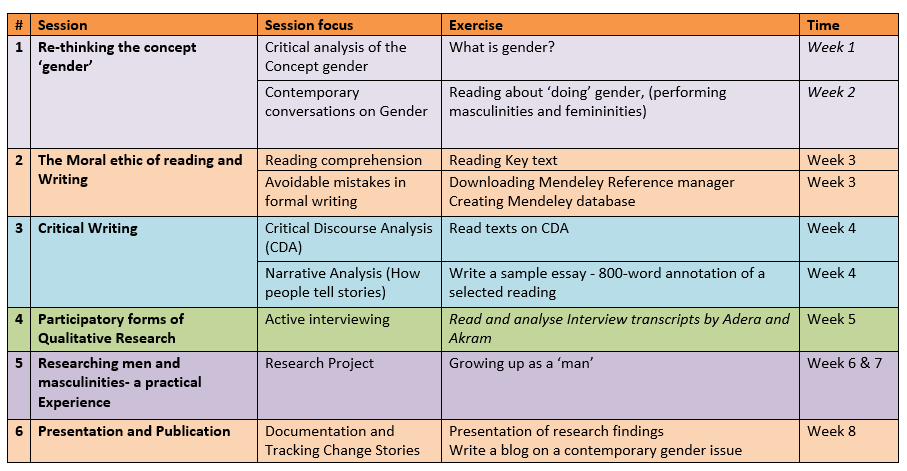COURSE SCHEDULE AND COST

CRIMM offers an introductory course to young working-class women and men to enhance their gender capacities in conducting cutting-edge research, critical reading and writing. The two-month fellowship adopts a blended model of delivery, combining both face-to-face and online pedagogical engagements. Details of the course continent are indicated below.
This session engages students into rethinking the concept gender, tracing the conceptual histories and the kinds of footprints gender discourses have inscribed in everyday life. Participants are urged to critically reflect on many existing gender definitions and make sense of these to contribute to what is already a contested concept gender.
Icebreaker: “Invest in women to benefit the Nation”.
Session outline
Critical analysis of the Concept gender.
• Re-defining gender
• Gender as a ‘performative’ act.
• Performing gender (masculinities and femininities) in everyday life.
• Internalized Performances.
• Performance Vs performativity
Contemporary conversations in Gender
• Understanding Essence, essentialism & Strategic Essentialism
• Agency
• Power and resistance as a form of power
• Instrumentalism
• Narrative and Discourse
This session engages participants in practical reading and writing and provides opportunity to identify and address ‘common mistakes’ in formal processes of knowledge production. The session equips participants with critical skills of self-reflexivity (writing self in the process of research and learning), relationships and representation of self and others in texts, avoidance of plagiarism, assumptions writers work with, etc. Some of the key questions that guide this session relate to: what motivates our reading/writing? When we are reading and writing, whom are we in conversation with? Whom are we writing for (audience)? How do these covert relations influence what we write about and what we marginalize/keep silent about?
Icebreaker: “The baby cried, the mother gave her milk ”Session outline
Reading comprehension
• How to read
• What to do before reading
Avoidable mistakes in reading
- Sentence structure
- Paragraph structure
- Coherent Argument
• Referencing-Practical Introduction to Mendeley Reference Manager
• Embedding references (blog)
• Avoiding plagiarism
- “Quotation”
- ‘Quote’
- [Quote]
- Cutting and pasting without acknowledging the authorship and authorial context.
This is a practical session that gives participants an opportunity to practice reading and writing. Participants are introduced to concepts and theories on discourse, in particular critical discourse analysis to enable them comprehend what they read and write in conscious ways.
Icebreaker: “I love you, but we cannot be together”.
Session Outline
• Critical Discourse Analysis (CDA)
- Foucauldian discourse analysis
- Analysis of (gender) power relations.
• Narrative Analysis (How people tell stories)
- Narrated “Experiences”.
- How narrators present themselves and others.
- Relations (power) in storytelling.
- Why stories are narrated the way they are told?
- Motives of storytellers.
Exercise:
Read, analyse texts on CDA/Narrative Analysis and write a sample essay - 800-word annotation of a selected reading
This session highlights the centrality of diverse forms of knowledge production that are informed by the qualitative epistemological strand. Participants are encouraged to reflect on ways in which knowledge is produced in research processes. Particular preface is given to inter-views as encounters and spaces for co-construction of knowledge, the place of narrative analysis as a theory and a creative methodology in knowledge production.
Icebreaker: “Now, let me speak as a mother…”
Session Outline
Active interviewing
• Inter-viewing (Active-inter-view)
• Researcher/participant relationship
• What counts as research data?
• Managing research information –transcribing and analysis of data.
• Types of qualitative data analysis
• What is new in research findings?
• What about ‘over-researched’ fields of study?
Exercise:
Read and analyse Interview transcripts by Adera and Akram
Participants are introduced to practical research through a project designed around interviewing men. This enables them to deploy skills acquired in reading, writing and research, ethics of research and cutting-edge processes of knowledge production.
Icebreaker: Making the strange familiar and making familiar strange e.g. “Who is a man?”
Session Outline
• Project Design on Researching men and masculinities
• Centering examination of men’s experiences in gender discourses
• Interviewing men – how, why and with what implications
• Understanding masculinities as gendered (power) relations.
• Performance of masculinities in everyday life-how men “do” gender.
Growing up as a ‘man’
Identify and interview TWO adult men (40 years and above) on their experiences of growing up as men.
• Develop an interview guide with a set of questions. These may include (but not limited to) men’s biographies – age, their cultural background, marital status, education background, employment status, etc.
• Enquire about their experiences of growing up as young boys – their likes, dislikes, hobbies, relationships, what they cherish in their boyhood
- Whether they had siblings (girls or boys) and how they related with them.
- Who is a man and how does it feel being a man?
- Pleasures/ ‘privileges and pressures of being a man?
• Request to be permitted to take notes/record.
• Transcribe the interview and use the transcript to write about your key findings
• The report should be well referenced 1,500 words; well referenced
Reflection: What new concepts, discourses did I learn?
This is a concluding session. It focuses on evaluating the process of delivering this course as well as tracking change stories among fellows. It aims to build fellows’ confidence both in presentation of self and in content to multiple audiences.
• Presentation of Research Study –findings(Project in session 5)
• Blog/Newspaper /Journal Article writing.
• Documentation and tracking change stories.
• What the course meant to me.
Exercise: Using findings from the research project above, write a blog on contemporary masculinities.
